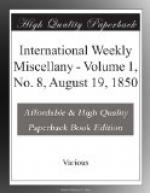From deficiency in taste for dramatic art arises the circumstance that talent for acting is incomparably scarce among the Russians. Great as have been the efforts of the last emperors of Russia to add a new splendor to their capitals by means of the theater, they have not succeeded in forming from their vast nation artists above mediocrity, except in low comedy. At last it was determined to establish dramatic schools in connection with the theaters and educate players; but it appears that though talent can be developed, it cannot be created at the word of command. The Emperor Nicholas, or rather his wife, was, as is said, formerly so vexed at the incapacity of the Russians for dramatic art, that it was thought best to procure children in Germany for the schools. The Imperial will met with hindrance, and he contented himself with taking children of the German race from his own dominions. The pride of the Russians did not suffer in consequence.
While poetry naturally precedes dramatic art, the drama, on the other hand, cannot attain any degree of excellence where the theater is in such a miserable state. It is now scarcely half a century since the effort was begun to remove the total want of scientific culture in the Russian nation, but what are fifty years for such a purpose, in so enormous a country? The number of those who have received the scientific stimulus and been carried to a degree of intellectual refinement is very small, and the happy accident by which a man of genius appears among the small number must be very rare. And in this connection it is noteworthy, that the Russian who feels himself called to artistic production almost always shows a tendency to epic composition.
The difficulties of form appear terrible to the Russian. In romance-writing the form embarrasses him less, and accordingly they almost all throw themselves into the making of novels.
As is generally the case in the beginning of every nation’s literature, any writer in Russia is taken for a miracle, and regarded with stupor. The dramatist Kukolnik is an example of this. He has written a great deal for the theater, but nothing in him is to be praised so much as his zeal in imitation. It must be admitted that in this he possesses a remarkable degree of dexterity. He soon turned to the favorite sphere of romance writing, but in this also he manifests the national weakness. In every one of his countless works the most striking feature is the lack of organization. They were begun and completed without their author’s ever thinking out a plot, or its mode of treatment.




